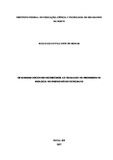Os saberes docentes necessários ao trabalho do professor de Biologia no ensino médio integrado

Visualizar/
Data
2017-07-24Autor
Morais, João Kaio Cavalcante de
http://lattes.cnpq.br/7422440536702479
Metadado
Mostrar registro completoResumo
The present study is part of the knowledge production about teachers training for Educação Profissional (EP) (Vocational School) and more specifically for Ensino Médio Integrado (EMI) (Integrated High School). We aim, in this dissertation, to propose a knowledge base that anchors the work of the biology teacher in the EMI. For this, we have used the studies of authors such as Shulman (1996), Saviani (1997), Araujo (2008), Carvalho and Gil-Perez (2011), Pimenta (2012), Moura (2014), Tardif (2014), which have characterized the bibliographical research as qualitative, having the historical dialectical materialism as the theoretical conceptual and methodological approach. Our knowledge proposition comes from two potentially relevant dimensions in the construction of the research object: EMI as a specific locus of the teaching work and the training of the licensed Biology teacher for this purpose. The results evidenced that the specificity of EMI - integral human education, work and research as educational principles and integrated curriculum - intends to make a specific teaching, which consequently demands specific knowledge. Associated with this, we realize that the Biology teacher training does not prepare this professional to work in consonance with these specificities. For these reasons, we propose a knowledge base that can anchor the teacher in the teaching and learning process in the EMI. Among them we can highlight: the knowledge related to the Biology subject, the knowledge related to the education sciences, the knowledges of the researcher, experiential knowledge, knowledge of the professional area in which he/she can act and critical contextual and attitudinal knowledge. Such knowledges are in line with the purposes of EMI and the material reality evidenced in the theoretical studies and in the empirical researches we consult. We understand that the mobilization of these knowledges can contribute to a teaching work of Biology that is consistent with the formative purposes of the EMI, as well as for emancipatory training, either for the teacher or student, since both are inserted in the context of the internal contradictions of the capitalist mode of production.



